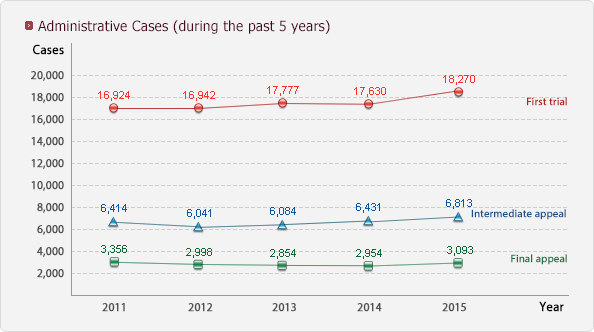Administrative
In administrative cases, the court decides on whether feasance or nonfeasance of administrative entities is illegal and resolves disputes surrounding legal relationships in public law.
Most administrative cases relate to revocation or affirmation of nullity of dispositions or decisions of administrative entities. Dispositions include levy of taxes, suspension or revocation of driver's license, refusal to pay industrial accident compensation insurance money, disciplinary measure against civil servants, suspension or revocation of business license, refusal to accept an application, etc. Decisions include decision of eminent domain by Central Land Tribunal, review decision by National Labor Relations Commission, decision of reparation by the Board of Audit and Inspection, etc. Action for affirmation of status as a civil servant and action regarding a contract in public law are examples of actions that concern legal relationships in public law. Moreover, action for affirmation of illegal nonfeasance is allowed if the administrative entity fails to respond to the application by the public.
Most administrative cases relate to revocation or affirmation of nullity of dispositions or decisions of administrative entities. Dispositions include levy of taxes, suspension or revocation of driver's license, refusal to pay industrial accident compensation insurance money, disciplinary measure against civil servants, suspension or revocation of business license, refusal to accept an application, etc. Decisions include decision of eminent domain by Central Land Tribunal, review decision by National Labor Relations Commission, decision of reparation by the Board of Audit and Inspection, etc. Action for affirmation of status as a civil servant and action regarding a contract in public law are examples of actions that concern legal relationships in public law. Moreover, action for affirmation of illegal nonfeasance is allowed if the administrative entity fails to respond to the application by the public.

Only a person who holds a direct and concrete legal interest from revocation of the disposition in question may bring an action before the court. If interest to be restored is indirect or abstract, then the action is not allowed.
In general, an action may be instituted without first resorting to a remedy arranged by an administrative entity. However, in regard to levy of taxes, suspension or revocation of driver's license, etc., exhaustion of administrative remedy is a prerequisite to filing an action with the court.
Legal relationships in administrative law need to be stabilized promptly since there are far-reaching consequences of these influences. In this regard, actions challenging legality of a disposition must be filed within the period prescribed by Administrative Litigation Act or other applicable laws.
In principle, administrative proceedings and civil proceedings have similarities in the way they are held. However, as administrative proceedings are more deeply related to the public interest, there is a greater need for the court to intervene ex officio in administrative proceedings rather than in civil proceedings. In administrative proceedings, the court may examine evidence ex officio and consider the facts not averred by the parties though the parties also bear the responsibility to make allegations and to produce evidence.
When disposition is deemed groundless, or, excessively harsh and severe with all circumstances taken into account, even if it has any ground, the court is to revoke disposition in favor of the plaintiff. However, even where a demand of the plaintiff is deemed reasonable, if revocation of disposition is deemed remarkably inappropriate to the public welfare, the court may reject the demand of the plaintiff.
The losing party, like in other proceedings, may appeal against the judgment rendered by the trial court to the High Court and then likewise to the Supreme Court.
As institution of an administrative action does not preclude the effect or execution of disposition, the judgment in favor of the plaintiff may turn out to be useless if it takes a long time to obtain such judgment. In this regard, Administrative Litigation Act empowers the court to provisionally suspend, upon a request from the plaintiff or ex officio, the effect or execution of disposition under certain circumstances. However, suspension of execution is not permitted if it is feared to have a seriously negative effect on the public welfare.

| Year | 2011 | 2012 | 2013 | 2014 | 2015 |
|---|---|---|---|---|---|
| First trial | 16,924 | 16,942 | 17,777 | 17,630 | 18,270 |
| Intermediate appeal | 6,414 | 6,041 | 6,084 | 6,431 | 6,813 |
| Final appeal | 3,356 | 2,998 | 2,854 | 2,954 | 3,093 |



